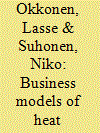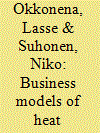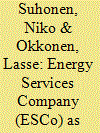|
|
|
Sort Order |
|
|
|
Items / Page
|
|
|
|
|
|
|
| Srl | Item |
| 1 |
ID:
096711


|
|
|
|
|
| Publication |
2010.
|
| Summary/Abstract |
This paper presents the business models of small-scale heat energy production in Finland. Firstly, the development of heat entrepreneurship in the country is presented, including the remarkable growth of small and medium size enterprises (SMEs) in the last 15 years. Secondly, the concept of business model (business architecture of product/service flows and earning logics) is modified to the framework of wood heat production. The business model concept, and its sub-concepts, is applied in a brief review of current heat energy businesses in Finland. We arrive at a business model of heat entrepreneurships that are public companies/utilities, public-private partnerships, private companies and cooperatives, Energy Saving Company (ESCO), network model of large enterprise and franchising. Descriptive cases of these models are presented. Finally, the paper concludes with a discussion on the applicability of the business models in different operational environments and geographical contexts.
|
|
|
|
|
|
|
|
|
|
|
|
|
|
|
|
| 2 |
ID:
097504


|
|
|
|
|
| Publication |
2010.
|
| Summary/Abstract |
This study analyses original panel data from 86 countries between 1985 and 2006. Econometric methods were used to identify the effects of different policy devices of power sector reforms on performance indicators (installed capacity per capita, transmission and distribution loss) in the countries analyzed. The research findings suggest that reform variables such as the entry of independent power producers (IPPs), unbundling of generation and transmission, establishment of regulatory agencies, and the introduction of a wholesale spot market are the driving forces of increasing generation capacity, as well as reducing transmission and distribution loss in the respective regions. In this study, we can assume that, firstly, different electric industry's reform policies/measures have different impacts on geographically and economically diverse countries. Secondly, a country's state of economic development has a different impact on policy effects of reforms. Thirdly, coexistent with independent regulatory agencies, reform policy becomes more powerful in realizing sector performances.
|
|
|
|
|
|
|
|
|
|
|
|
|
|
|
|
| 3 |
ID:
125578


|
|
|
|
|
| Publication |
2013.
|
| Summary/Abstract |
Energy Services Companies are widely implemented for improving energy efficiency both in the public sector and industry. The model has also been introduced as a business model for biomass-based heat entrepreneurship. However, the residential sector has been problematic with regard to ESCo adoption and constitutes a minor share of ESCo operations. The barriers, both social and economic, are many. This paper focuses on the application of ESCo as a business model for heat entrepreneurship in Finland. First, we present the ESCo model and a review of the main barriers. Second, we present the modelling with aspects of profitability and risk sharing. Third, we demonstrate the operation in the residential sector by using 26 housing associations as a case study. We simulate the energy investment, profitability of operation, and the sharing of risks between the customer and the ESCo. The results indicate that the ESCo model is challenging in our case area. Low profit levels and the assumed customer's preference for achieving cost savings from the beginning of energy renovation can result in long contract periods tying up the capital. The ESCo model is unattractive in the current business climate, requiring modifications or integration with other maintenance services of housing associations.
|
|
|
|
|
|
|
|
|
|
|
|
|
|
|
|
|
|
|
|
|